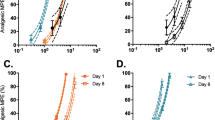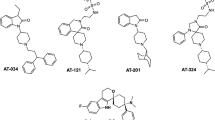Abstract
For centuries, opioid drugs have been the mainstay of chronic pain treatment. However, over time analgesic tolerance develops, leaving few treatment options. Here we show that platelet-derived growth factor receptor-β (PDGFR-β)-mediated signaling plays a key role in morphine tolerance. PDGFR-β inhibition selectively eliminates morphine tolerance in rats. PDGFR-β inhibitors are widely used and well tolerated, suggesting that clinical translation of our findings could reduce the suffering endured by individuals with intractable pain.
This is a preview of subscription content, access via your institution
Access options
Subscribe to this journal
Receive 12 print issues and online access
$209.00 per year
only $17.42 per issue
Buy this article
- Purchase on Springer Link
- Instant access to full article PDF
Prices may be subject to local taxes which are calculated during checkout


Similar content being viewed by others
References
Valenzuela, C.F. et al. J. Biol. Chem. 271, 16151–16159 (1996).
Trujillo, K.A. & Akil, H. Science 251, 85–87 (1991).
Rice, A.S.C. & Hill, R.G. Annu. Rev. Med. 57, 535–551 (2006).
Chen, C., Farooqui, M. & Gupta, K. Curr. Neurovasc. Res. 3, 171–180 (2006).
Belcheva, M.M., Szucs, M., Wang, D., Sadee, W. & Coscia, C.J. J. Biol. Chem. 276, 33847–33853 (2001).
Dai, H., Marbach, P., Lemaire, M., Hayes, M. & Elmquist, W.F. J. Pharmacol. Exp. Ther. 304, 1085–1092 (2003).
Gold, L.H., Stinus, L., Inturrisi, C.E. & Koob, G.F. Eur. J. Pharmacol. 253, 45–51 (1994).
Gutstein, H. & Akil, H. in Goodman & Gilman's The Pharmacological Basis of Therapeutics (eds. Brunton, L., Lazo, J. & Parker, K.) 547–590 (McGraw-HIll, New York, 2006).
Aghajanian, G.K. & Wang, Y.Y. Neuropharmacology 26, 793–799 (1987).
Karaman, M.W. et al. Nat. Biotechnol. 26, 127–132 (2008).
Herrlich, A. et al. Proc. Natl. Acad. Sci. USA 95, 8985–8990 (1998).
Kolesnikov, Y., Jain, S., Wilson, R. & Pasternak, G.W. J. Pharmacol. Exp. Ther. 284, 455–459 (1998).
Malmberg, A.B. & Yaksh, T.L. Pain 54, 291–300 (1993).
Coderre, T.J. & Van Empel, I. Pain 59, 345–352 (1994).
Black, M.J., Woo, Y. & Rane, S.G. J. Neurosci. Res. 74, 23–36 (2003).
Timpe, L.C. & Fantl, W.J. J. Neurosci. 14, 1195–1201 (1994).
Williams, J.T., Christie, M. & Manzoni, O. Physiol. Rev. 81, 299–343 (2001).
Frace, A.M. & Gargus, J.J. Proc. Natl. Acad. Sci. USA 86, 2511–2515 (1989).
Andrae, J., Gallini, R. & Betsholtz, C. Genes Dev. 22, 1276–1312 (2008).
Gingras, A.C., Raught, B. & Sonenberg, N. Annu. Rev. Biochem. 68, 913–963 (1999).
Acknowledgements
We thank J. Dulin, T. Sylvester and C. Schultz for technical support. This work was funded by grants from the US National Institute on Drug Abuse R01DA15146 and the US National Institute on Alcohol Abuse and Alcoholism R01AA16157 to H.B.G. We dedicate this work to the memory of our colleague and dear friend Bing Mo, who tragically passed away before these studies were completed.
Author information
Authors and Affiliations
Contributions
Y.W., K.B., S.S., M.D. and B.M. performed experiments and analyzed data. H.B.G. conceived and designed all experiments, interpreted results and wrote the manuscript.
Corresponding author
Ethics declarations
Competing interests
The authors declare no competing financial interests.
Supplementary information
Supplementary Text and Figures
Supplementary Figures 1–11 and Supplementary Methods (PDF 1478 kb)
Rights and permissions
About this article
Cite this article
Wang, Y., Barker, K., Shi, S. et al. Blockade of PDGFR-β activation eliminates morphine analgesic tolerance. Nat Med 18, 385–387 (2012). https://doi.org/10.1038/nm.2633
Received:
Accepted:
Published:
Issue Date:
DOI: https://doi.org/10.1038/nm.2633
This article is cited by
-
Ptchd1 mediates opioid tolerance via cholesterol-dependent effects on μ-opioid receptor trafficking
Nature Neuroscience (2022)
-
Enhancing KCC2 function counteracts morphine-induced hyperalgesia
Scientific Reports (2017)
-
Loss of μ opioid receptor signaling in nociceptors, but not microglia, abrogates morphine tolerance without disrupting analgesia
Nature Medicine (2017)
-
Opioids: keeping the good, eliminating the bad
Nature Medicine (2017)
-
Morphine hyperalgesia gated through microglia-mediated disruption of neuronal Cl− homeostasis
Nature Neuroscience (2013)



